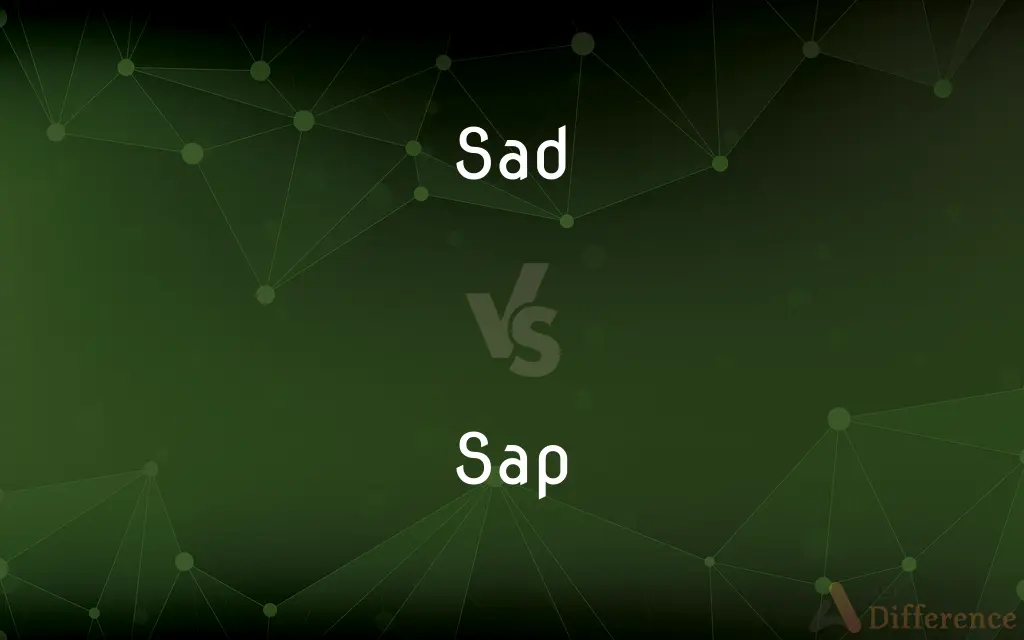Sad vs. Sap — What's the Difference?
By Tayyaba Rehman & Fiza Rafique — Updated on May 4, 2024
"Sad" denotes an emotional state characterized by feelings of unhappiness and dejection; "sap," on the other hand, refers to the fluid essential for a plant's nutrition, or can mean to gradually weaken or diminish something.

Difference Between Sad and Sap
Table of Contents
ADVERTISEMENT
Key Differences
Sad is an adjective that describes an emotional condition marked by feelings of unhappiness, disappointment, or despair. It is often used in human contexts to express a state of sorrow or emotional pain. Whereas sap has two primary meanings: as a noun, it describes the vital fluid that circulates through a plant, carrying nutrients and water; as a verb, it means to deplete or drain, often used metaphorically to describe reducing someone's strength or vitality.
Sad can result from a variety of personal experiences, from the loss of a loved one to receiving bad news, reflecting a temporary or prolonged emotional state. On the other hand, sap as a verb involves a gradual process, where something is weakened or vitality is reduced over time, whether it’s energy, resources, or morale.
Sad is universally understood and can be easily identified in individuals by behavioral changes, body language, and facial expressions. Whereas sap requires a more contextual understanding, especially when used as a verb, since its effects might not be immediately visible and often occur over an extended period.
Sad primarily affects individuals or groups emotionally and can influence mental health and general well-being. In contrast, sap affects both physical entities, like trees or structures, when used in the literal sense of draining vital fluids or resources, and metaphorically, such as when someone’s energy or enthusiasm is drained.
Sad is an inherent part of human emotional experiences and can lead to growth, empathy, and understanding through personal reflection or communal support. Whereas sap, in its verb form, typically has negative connotations, suggesting a deterioration or reduction of strength, power, or health that needs to be countered or managed.
ADVERTISEMENT
Comparison Chart
Primary Meaning
Emotional state of unhappiness or sorrow.
Noun: Fluid in plants. Verb: To weaken or deplete gradually.
Context
Psychological, emotional.
Noun: Botanical. Verb: Physical or metaphorical depletion.
Effects
Affects mood and behavior.
Noun: Essential for plant life. Verb: Results in weakening.
Visibility
Emotional expression is often visible.
Noun: Internal to plants. Verb: Effects may be gradual.
Connotation
Generally negative but a natural part of emotional life.
Noun: Neutral. Verb: Negative, associated with loss or decrease.
Compare with Definitions
Sad
Pathetically inadequate or unfashionable.
The old equipment at the gym was sad and outdated.
Sap
(Noun) The fluid which circulates in the vascular system of a plant.
The sap rises in the trees in spring.
Sad
Causing or characterized by sorrow or regret; unfortunate and regrettable.
It was a sad mistake that cost them the game.
Sap
(Verb) To undermine the foundations or integrity of something.
Doubts began to sap his resolve.
Sad
(Informal) Deplorably bad; sorry.
The quality of the food was sad.
Sap
(Verb) To drain someone of strength or vitality.
The long war had sapped their resources.
Sad
Feeling or showing sorrow; unhappy.
She felt sad after hearing the distressing news.
Sap
(Noun) A foolish or gullible person.
He's such a sap, believing every tall tale they tell.
Sad
Feeling or showing sorrow; unhappy
They looked at her with sad, anxious faces
I was sad and subdued
Sap
Sap is a fluid transported in xylem cells (vessel elements or tracheids) or phloem sieve tube elements of a plant. These cells transport water and nutrients throughout the plant.
Sad
Pathetically inadequate or unfashionable
The show is tongue-in-cheek—anyone who takes it seriously is a bit sad
Sap
The watery fluid that circulates through a plant, carrying food and other substances to the various tissues.
Sad
(of dough) heavy through having failed to rise.
Sap
See cell sap.
Sad
Showing, expressing, or feeling sorrow or unhappiness
A sad face.
Sap
Health and energy; vitality
The constant bickering drained his sap away.
Sad
Causing sorrow or gloom; depressing
A sad movie.
Sad news.
Sap
(Slang) A foolish or gullible person.
Sad
Deplorable or inadequate; sorry
A sad state of affairs.
A sad excuse.
Sap
A covered trench or tunnel dug to a point near or within an enemy position.
Sad
Dark-hued; somber.
Sap
A leather-covered bludgeon with a short, flexible shaft or strap, used as a hand weapon.
Sad
(heading) Emotionally negative.
Sap
To drain (a tree, for example) of sap.
Sad
Feeling sorrow; sorrowful, mournful.
She gets sad when he's away.
Sap
To deplete or weaken gradually
The noisy children sapped all my energy. The flu sapped him of his strength.
Sad
Appearing sorrowful.
The puppy had a sad little face.
Sap
To undermine the foundations of (a fortification).
Sad
Causing sorrow; lamentable.
It's a sad fact that most rapes go unreported.
Sap
To dig a sap.
Sad
Poor in quality, bad; shameful, deplorable; later, regrettable, poor.
That's the saddest-looking pickup truck I've ever seen.
Sap
To hit or knock out with a sap.
Sad
Of colours: dark, deep; later, sombre, dull.
Sap
(uncountable) The juice of plants of any kind, especially the ascending and descending juices or circulating fluid essential to nutrition.
Sad
(obsolete) Sated, having had one's fill; satisfied, weary.
Sap
(uncountable) The sapwood, or alburnum, of a tree.
Sad
(obsolete) Steadfast, valiant.
Sap
Any juice.
Sad
(obsolete) Dignified, serious, grave.
Sap
(figurative) Vitality.
Sad
(obsolete) Naughty; troublesome; wicked.
Sap
A naive person; a simpleton
Sad
(slang) Unfashionable; socially inadequate or undesirable.
I can't believe you use drugs; you're so sad!
Sap
A short wooden club; a leather-covered hand weapon; a blackjack.
Sad
(dialect) Soggy (to refer to pastries).
Sap
(military) A narrow ditch or trench made from the foremost parallel toward the glacis or covert way of a besieged place by digging under cover of gabions, etc.
Sad
(obsolete) Heavy; weighty; ponderous; close; hard.
Sap
(transitive) To drain, suck or absorb from (tree, etc.).
Sad
To make melancholy; to sadden or grieve (someone).
Sap
To exhaust the vitality of.
Sad
Sated; satisfied; weary; tired.
Yet of that art they can not waxen sad,For unto them it is a bitter sweet.
Sap
To strike with a sap (with a blackjack).
Sad
Heavy; weighty; ponderous; close; hard.
His hand, more sad than lump of lead.
Chalky lands are naturally cold and sad.
Sap
(transitive) To subvert by digging or wearing away; to mine; to undermine; to destroy the foundation of.
Sad
Dull; grave; dark; somber; - said of colors.
Woad, or wade, is used by the dyers to lay the foundation of all sad colors.
Sap
To pierce with saps.
Sad
Serious; grave; sober; steadfast; not light or frivolous.
Lady Catharine, a sad and religious woman.
Which treaty was wisely handled by sad and discrete counsel of both parties.
Sap
(transitive) To make unstable or infirm; to unsettle; to weaken.
Sad
Affected with grief or unhappiness; cast down with affliction; downcast; gloomy; mournful.
First were we sad, fearing you would not come;Now sadder, that you come so unprovided.
The angelic guards ascended, mute and sad.
Sap
(transitive) To gradually weaken.
To sap one’s conscience
He saps my energy
Sad
Afflictive; calamitous; causing sorrow; as, a sad accident; a sad misfortune.
Sap
(intransitive) To proceed by mining, or by secretly undermining; to execute saps.
Sad
Hence, bad; naughty; troublesome; wicked.
Sap
The juice of plants of any kind, especially the ascending and descending juices or circulating fluid essential to nutrition.
Sad
To make sorrowful; to sadden.
How it sadded the minister's spirits!
Sap
The sapwood, or alburnum, of a tree.
Sad
Seasonal affective disorder.
Sap
A simpleton; a saphead; a milksop.
Sad
Experiencing or showing sorrow or unhappiness;
Feeling sad because his dog had died
Better by far that you should forget and smile / Than that you should remember and be sad
Sap
A narrow ditch or trench made from the foremost parallel toward the glacis or covert way of a besieged place by digging under cover of gabions, etc.
Sad
Of things that make you feel sad;
Sad news
She doesn't like sad movies
It was a very sad story
When I am dead, my dearest, / Sing no sad songs for me
Sap
To subvert by digging or wearing away; to mine; to undermine; to destroy the foundation of.
Nor safe their dwellings were, for sapped by floods,Their houses fell upon their household gods.
Sad
Bad; unfortunate;
My finances were in a deplorable state
A lamentable decision
Her clothes were in sad shape
A sorry state of affairs
Sap
To pierce with saps.
Sap
To make unstable or infirm; to unsettle; to weaken.
Ring out the grief that saps the mind.
Sap
To proceed by mining, or by secretly undermining; to execute saps.
Both assaults are carried on by sapping.
Sap
A watery solution of sugars, salts, and minerals that circulates through the vascular system of a plant
Sap
A person who lacks good judgment
Sap
A piece of metal covered by leather with a flexible handle; used for hitting people
Sap
Deplete;
Exhaust one's savings
We quickly played out our strength
Sap
Excavate the earth beneath
Common Curiosities
How do sadness and emotional sapping differ in their impact on a person?
Sadness is an emotional state that typically resolves over time, while being emotionally sapped can lead to prolonged fatigue or apathy.
Is there any positive aspect to feeling sad?
Yes, sadness can enhance empathy, deepen personal insights, and lead to meaningful life changes.
Can sadness lead to being sapped of energy?
Yes, chronic sadness or depression can sap a person of energy, motivation, and vitality.
How can one replenish energy that has been sapped?
Rest, proper nutrition, support from friends or family, and engaging in revitalizing activities can help restore energy.
What does it mean when someone is described as a 'sap'?
This is a slang term meaning someone is naive or easily deceived.
Can environmental factors sap one’s strength?
Yes, factors like extreme weather, stressful environments, or lack of resources can physically or mentally sap strength.
How does the sap of a plant function in its growth?
Sap carries essential nutrients and water throughout the plant, crucial for its growth and survival.
How can one address the feeling of being sapped?
Addressing underlying causes, seeking professional help, and adopting healthful coping mechanisms can mitigate feelings of being sapped.
What are some common causes of sadness?
Loss, disappointment, failure, or even broader existential concerns can cause sadness.
Is sap visible in plants?
While sap itself is not typically visible, its movement can be observed indirectly through the health and growth of the plant.
Share Your Discovery

Previous Comparison
Branch vs. Fork
Next Comparison
Forgot vs. ForgottenAuthor Spotlight
Written by
Tayyaba RehmanTayyaba Rehman is a distinguished writer, currently serving as a primary contributor to askdifference.com. As a researcher in semantics and etymology, Tayyaba's passion for the complexity of languages and their distinctions has found a perfect home on the platform. Tayyaba delves into the intricacies of language, distinguishing between commonly confused words and phrases, thereby providing clarity for readers worldwide.
Co-written by
Fiza RafiqueFiza Rafique is a skilled content writer at AskDifference.com, where she meticulously refines and enhances written pieces. Drawing from her vast editorial expertise, Fiza ensures clarity, accuracy, and precision in every article. Passionate about language, she continually seeks to elevate the quality of content for readers worldwide.
















































